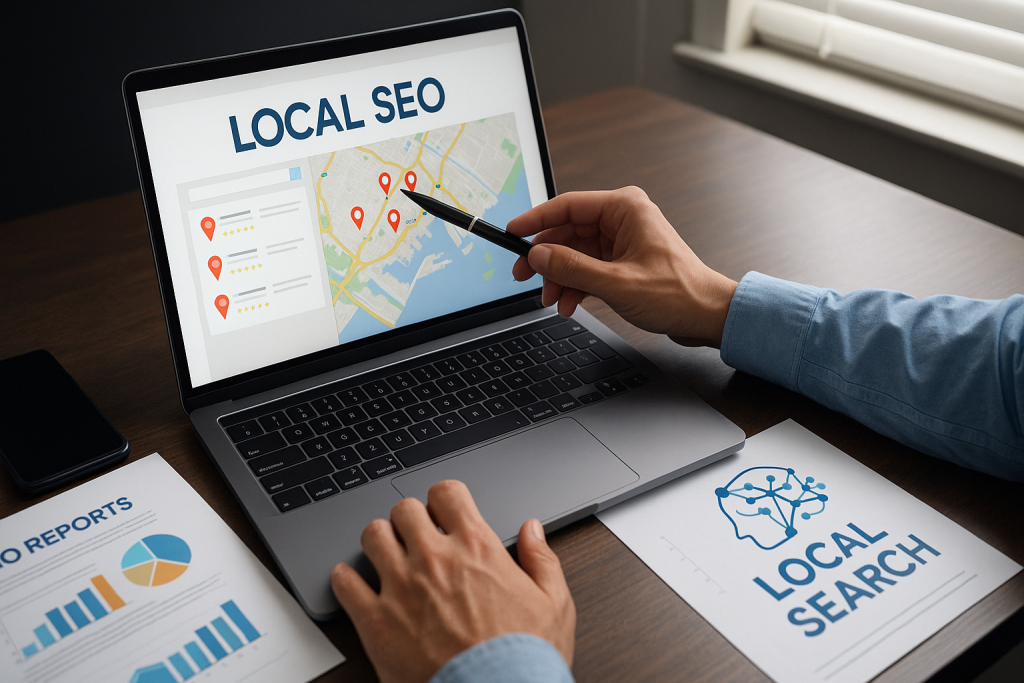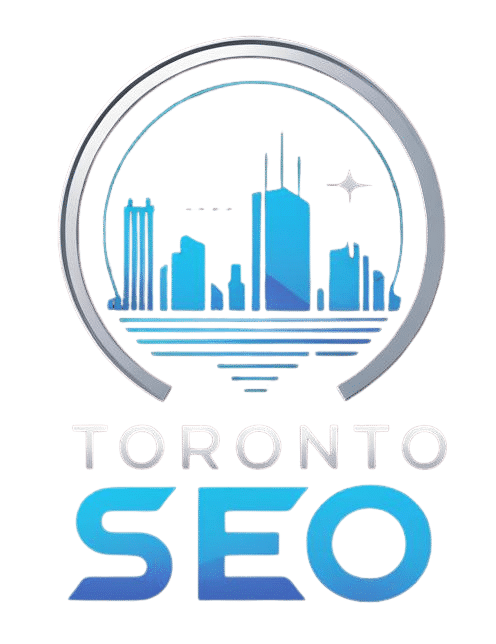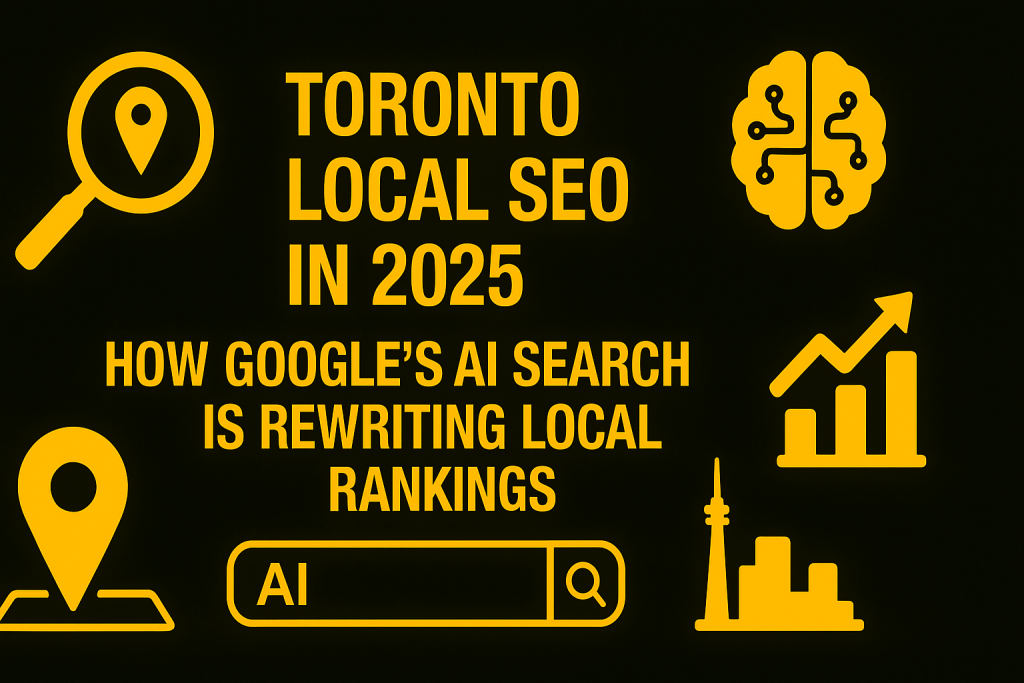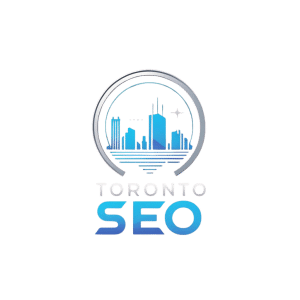The AI Revolution Hits Toronto’s Local Search
In 2025, Toronto’s local SEO landscape is being reshaped by artificial intelligence. Google’s Search Generative Experience (SGE) is no longer an experiment—it’s the default experience for millions of users. Traditional ranking tactics like keyword stuffing, citation farming, or spammy backlinks are losing ground. Instead, AI-powered contextual understanding, entity recognition, and real-world reputation signals are dominating local SEO rankings.
For Toronto businesses—from restaurants in Liberty Village to law firms in North York—staying visible in AI-powered search now means understanding how Google interprets brand identity, location relevance, and user intent at a deeper level than ever before.
Understanding Google’s AI Search in 2025
From Keywords to Context: The Core of AI Search
Google’s AI models are now capable of interpreting searcher intent beyond keywords. For instance, when someone searches “best vegan brunch near the Distillery District,” Google no longer relies solely on citations or reviews. Instead, its AI analyzes:
The semantic relationship between your content and local intent.
Verified signals like your Google Business Profile.
On-site authority and engagement metrics.
This marks a clear shift from old-school SEO to entity-based local optimization.
To learn how Toronto agencies are adapting, check out The Future of SEO in Toronto: Where Artificial Intelligence Meets Search Strategy.
How AI Affects Toronto’s Local Ranking Factors
1. E-E-A-T Is Now Location-Aware
Google’s AI evaluates Experience, Expertise, Authoritativeness, and Trustworthiness (E-E-A-T) with a local twist. It now cross-references:
Your business mentions across local directories.
Consistency of NAP data (Name, Address, Phone).
Geo-tagged engagement (e.g., user reviews from local residents).
This means your real-world presence is now just as crucial as your digital footprint. For instance, consistent local reviews and social mentions tied to a Toronto neighborhood improve your entity authority.
Related: Why Citation Building Still Matters for Toronto Local Rankings in 2025
2. Google Maps Is Now Predictive
In 2025, Google Maps integrates predictive AI. It no longer just lists nearby results—it anticipates what users might want based on patterns. If a user visits a Toronto fitness studio weekly, searches “healthy lunch nearby,” Google may recommend nearby cafes with strong local SEO signals.
To benefit, Toronto businesses must:
Optimize their Google Business Profile Toronto with structured data and photos.
Keep location-specific landing pages updated.
Ensure business hours, menus, and reviews reflect live updates.
For optimization, read Google Business Profile Toronto Guide.
3. AI-Driven Content Clustering Boosts Local Authority
AI-driven topic clustering allows Google to connect related content from your domain. For example, if your SEO agency in Toronto has clusters like “AI SEO,” “local business optimization,” and “Google SGE,” the system identifies thematic authority.
To leverage this, brands should publish interconnected articles that reflect intent-based content architecture, not just random blog posts. Agencies like Toronto SEO are already helping businesses implement AI-powered clustering to dominate local SERPs.
Learn more in Toronto Marketing Agencies Are Winning With AI-Driven Keyword Clustering in 2025.
Local SEO Strategies That Work in Toronto’s AI-Driven Landscape
1. Entity Optimization: Your Digital Fingerprint
AI search relies heavily on entity optimization—ensuring Google understands what your business is and who it serves. Businesses in Toronto should:
Use schema markup (LocalBusiness, Organization, Review).
Link to authoritative sites like Canada.ca Business Directory.
Build consistent mentions across local publications and industry associations.
These actions create a semantic web that helps Google’s AI identify your business as a verified local entity.

2. Hyperlocal Content Targeting
Generic city pages no longer rank as they used to. Toronto’s AI-driven search now prioritizes micro-location content—pages that serve specific boroughs or neighborhoods like:
“SEO for Restaurants in Leslieville”
“Real Estate SEO in Midtown Toronto”
“Healthcare SEO in Etobicoke”
This hyperlocal strategy ensures visibility across diverse search intents and supports strong internal linking opportunities. A related resource is Local SEO Tips for Toronto Businesses: Rank in the Google 3-Pack.
3. AI-Powered Review and Reputation Management
Reviews now feed directly into Google’s Knowledge Graph and influence AI interpretations of trust. Use automation tools to:
Monitor review sentiment.
Respond with keyword-rich local context.
Encourage satisfied clients to mention service area keywords like “Toronto,” “GTA,” or neighborhood names.
This tactic reinforces location authority and organic trust signals.
4. Technical SEO Meets AI Expectations
With SGE integrated, technical SEO remains vital but with new benchmarks:
Use structured data for hours, services, and locations.
Improve Core Web Vitals Toronto scores for speed and UX.
Integrate voice search optimization for mobile and AI assistants.
For a deeper dive, visit Core Web Vitals Toronto: Real Fixes That Boost Ranking.
5. Conversion-Focused AI SEO
Traffic alone won’t sustain rankings in 2025. Google’s AI measures user satisfaction signals—how well visitors interact with your page.
Optimize for engagement:
Use AI-driven heatmaps to track behavior.
Create conversion-first content that matches buyer intent.
Implement interactive features like quote forms or chatbots.
See more insights in Conversion-First SEO in Toronto.
The New Competitive Edge: Local Authority Through AI Branding
AI search doesn’t just list results—it curates recommendations based on trust and brand recognition. Toronto brands that invest in personal branding, media coverage, and thought leadership will naturally rank higher in AI-driven local results.
Explore this further in Why Building a Personal Brand in Search Is the Next Big Move for Toronto Founders.
External Insights: Industry-Wide Shifts in Local SEO
Google’s official documentation and AI research initiatives confirm that entity understanding and real-world engagement are integral to AI-driven search systems. The Google AI Blog frequently discusses how generative AI improves contextual understanding.
Similarly, Think with Google reports that “near me” searches are evolving into intent-driven experiences, not just location-based lookups. Businesses that personalize their content to these nuances will win visibility and trust.
Future Outlook: Toronto’s Local SEO in the Next Two Years
By 2026, Google’s AI may start automating ranking feedback loops, where data from user interactions continuously reshapes the algorithm. This means:
Businesses with consistent user engagement will climb faster.
SEO agencies that integrate AI monitoring tools will outperform traditional ones.
AI will reward authentic, localized content rather than generic SEO filler.
Forward-thinking agencies like TorontoSEO.com are already preparing brands to navigate this evolution through AI keyword mapping and machine-learning performance analytics.
Conclusion: Stay Visible in Toronto’s AI Search Era
The future of Toronto Local SEO belongs to businesses that merge AI insights with local authenticity. The days of manipulating Google with backlinks and keyword tricks are over. Success now comes from understanding how AI reads your brand, community relevance, and user satisfaction.
Toronto businesses that adapt early—by embracing entity optimization, micro-location content, and AI-powered engagement—will dominate both traditional and generative search.
For expert consultation on AI-powered SEO strategy, contact TorontoSEO.com.
FAQs
1. What is Google’s AI Search Generative Experience (SGE)?
SGE is Google’s AI-powered search interface that provides summarized, conversational responses based on multiple data points, affecting how local businesses appear in search.
2. How has AI changed local SEO in Toronto?
AI focuses on context, intent, and entities rather than keyword density. It rewards locally relevant, high-quality content tied to verified business entities.
3. Can small Toronto businesses compete with big brands in AI search?
Yes. With accurate entity data, strong local reviews, and AI-optimized content, even small businesses can outrank large corporations in localized searches.
4. What are the top AI SEO tools for Toronto businesses in 2025?
Tools like Surfer AI, Clearscope, and Jasper AI are helping Toronto SEO agencies generate optimized content clusters tailored for SGE.
5. How can I prepare my website for AI-powered search?
Focus on structured data, local schema, hyperlocal content, and optimizing user experience signals like engagement and mobile responsiveness.


